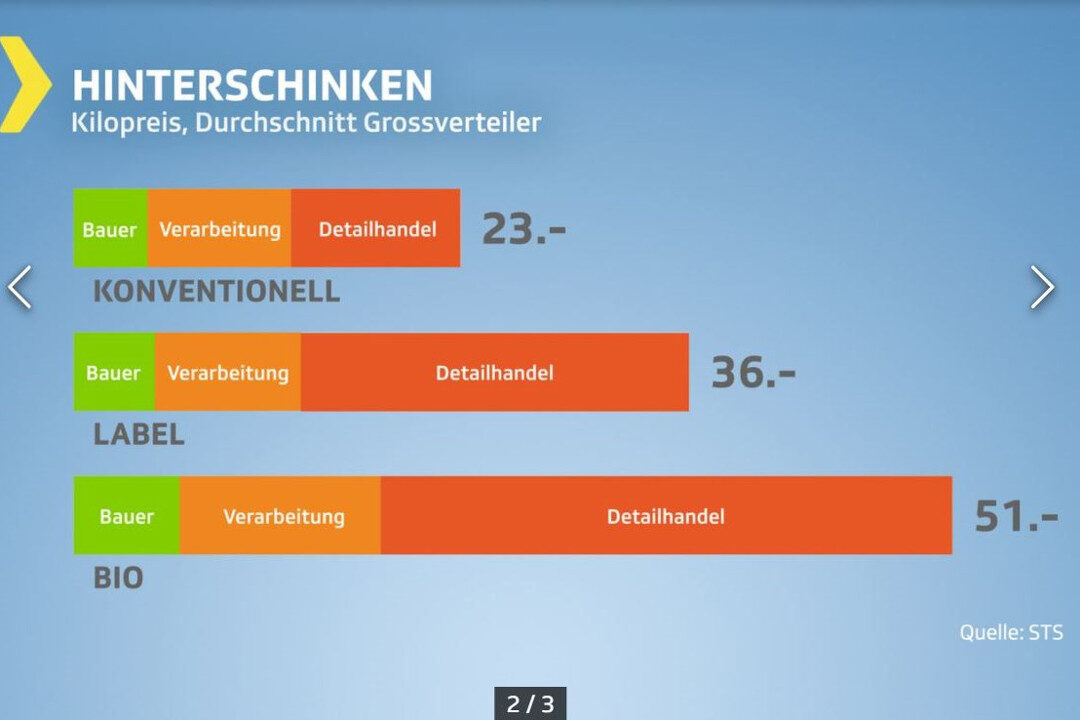“Every litre of milk I produce is a loss to me”. This statement from my father made me so sad and angry at the same time that I decided to do something in 2018. Full of zest for action, I found out about breeding insects, growing hemp or making cheese. I also dealt with sports nutrition and without further ado I transformed the kitchen into a protein bar bakery with integrated milk shake production. The aim was to help my parents to find new branches of business so that they would be less dependent on milk price developments and direct payments.
Questionable development
But what is the point of helping my family if almost three businesses close down at the same time every day in Switzerland? For many people, agriculture is no longer profitable. Investments are a no-go. Many can barely keep their heads above water with the direct payments from the federal government. For some, the conversion to organic farming is not even financially feasible with the best will in the world. And those who manage it have no guarantee that they will be compensated for the extra work in the end. This has been impressively proven by a study of the consumer magazine K-Tipp from June 2020, which examined the price composition of labelled meat (see video from 8.55 min).

Has agricultural policy failed?
If a litre of milk yields less than it costs to produce and every price increase is to the benefit of the retailers, then something can go wrong with the system. Consumers want a nature-friendly agriculture. At the same time, new pests are constantly being brought in from faraway countries, which are causing the local crops a great deal of trouble and whose control means considerable extra expense.
Setting an example
With every crooked carrot that we, as consumers, put back on the shelf, we are giving the retailers a sign. A sign that only perfectly formed food is being bought. It’s no wonder that some fruits and vegetables today are visually appealing, but never match the taste of tomatoes and cucumbers from your own garden. And especially those who are against food waste should rethink their shopping behaviour. However, to bring the taste back onto our plates, it is not only us consumers, but also retailers and politicians who need to create clear incentives to produce nutritious and tasty food at cost-covering prices.

New ways thanks to direct marketing
Cover the costs, but how? In all the research I have done, I have realised that while many consumers are prepared to pay higher prices for their food, only a fraction of this additional income is passed on to farmers. That is why I see direct marketing as the only solution that can be implemented in the foreseeable future.
But how sensible is it to limit myself to my parents’ (but rather small) farm? Why not make it possible for all Swiss farmers to have an Internet presence to present their products and services? No sooner said than done. As a trained primary school teacher and banker, I ventured into programming without further ado. Fortunately, I received support from Urs Schlegel from Schwyz, who still supports me today with helpful tips and tricks. He became aware of Mucca.ch thanks to my appeal for donations on wemakeit.com, with which I introduced the site and presented it in German, French and Italian (see video from May 2018).
Always stay motivated
After that, everything happened quite quickly: I was contacted by various companies and consultants who wanted to meet me. Some of them even tried to stop me from doing so or to get involved. But I always remained motivated and am proud to be independent and to be able to write freely even today. It is only thanks to my strong will and persistence that I am still able to put new profiles online, publish blog articles and look forward to any positive feedback if direct marketing works out.
And although the administration of such a platform is quite time-consuming and I am doing further training in addition to the 100% workload, I will continue to fight for sustainable agriculture in the future. Because only if producers and consumers move closer together again, if the conscious use of food is promoted and the willingness to pay fair prices is increased, will Swiss agriculture and with it thousands of family farms have a chance at all.





Leave a comment